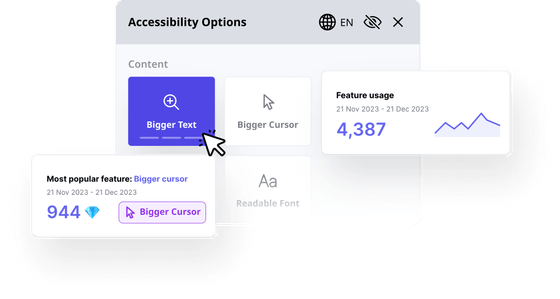The California Unruh Civil Rights Act is one of the foremost pieces of legislation protecting individuals from discrimination based on protected classes, including, but not limited to, race and religion.
Under this Civil Rights Act, no business establishment in California can discriminate when providing goods and services. It offers broad protection encompassing characteristics one is born with or chooses, such as race, national origin, and sexual orientation. Any business organization caught engaging in any number of ADA violations can be sued by plaintiffs for actual damages through the California civil court system.
Continuing to learn more about the California Unruh Civil Rights Act, including California website accessibility laws, all possible penalties, damages victims can seek, legal processes involved, and any exceptions that can apply.

Understanding Unruh Act Penalties and Damages
Under the California Unruh Civil Rights Act, any business organization found to be discriminatory when providing goods, services, or public accommodation can expect several imposed penalties, including the following:
Monetary Compensation
If you violate the Unruh Act or any civil code section, expect to pay serious fines, attorney’s fees, and face other repercussions. The monetary value of actual damages depends on several factors, such as the type of discrimination, the duration of the offense, and evidence presented by the plaintiff regarding its impact on their well-being.
In the worst-case scenario, Unruh Civil Rights Act penalties can significantly impact a business’s prospects.
Lost Licensing
Any offending business or organization violating the Unruh Act disability rights can have its licenses revoked, preventing it from operating in the state. This can lead to job losses, lost income, and a damaged brand reputation. Various regulatory agencies throughout California are responsible for enforcing the revocation of licenses and permits.
Mandated Training
Were you responsible for gender price discrimination? What about a lack of accommodations for the mobility impaired? Court orders can impose heavy corrective actions, such as mandating training for employees on a web accessibility app, web accessibility training, and anti-discrimination practices under state law.
Complying with the ADA in California is crucial to avoid significant repercussions, like a civil penalty or damages claimed by plaintiffs.
Explaining Unruh Civil Rights Act Penalties and Damages
Under the Unruh Act and California civil code, plaintiffs are entitled to various special and general damages depending on the severity of the offense committed by the offending business or organization.
One primary consideration is compensatory damages reimbursed to the plaintiff for lost income, attorney’s fees, civil penalties, and other claimed harm due to the defendant’s actions. All types of evidence can corroborate the damages requested by the plaintiff, including medical records, job loss, and other provable indicators.
Plaintiffs can also seek punitive damages, which aim less at compensation and more at punishing the offending party for violating the Unruh Act and its civil rights laws for full and equal accommodations.
A statutory minimum amount should also be noted. Sometimes, the law dictates fixed amounts for actual damages to expedite the trial process.
In addition to compensatory and punitive damages, a minimum statutory damages amount, and other reasonable compensation, plaintiffs defending themselves under the Unruh Act can also collect attorney fees and costs from business dealings, seek injunctive relief, and receive monetary damages.
A Word on Statutory Damages under the Unruh Act
Statutory damages can be awarded to plaintiffs even if there’s no financial loss due to discrimination. They are intended to address emotional distress and deter Unruh Act violators from discriminating by making payouts that may be higher than actual damages. For example, someone refusing to be served or employed because of their age or gender could be awarded statutory damages. In short, it’s an actual payout to plaintiffs who cannot prove a financial loss.
Exemptions To The Unruh Act
While the Unruh disabilities act is designed to provide equal access across the public sphere, some business establishments may be exempt from Unruh Act violations for several reasons.
One such exemption is a filed claim under Bona Fide Occupational Qualification (BFOQ), which can shield a business from the Unruh Civil Rights Act if it can prove that specific jobs can only be performed by individuals who meet certain protected class requirements, such as age and gender.
Another discrimination exemption under the Unruh Act is for religious institutions, such as churches and synagogues, which may hire based on specific characteristics not typically applied in a professional workplace setting due to their spiritual nature. However, this exemption does not grant religious organizations carte blanche to discriminate, as they are still expected to comply with some accessibility requirements.
A third exception to consider is reasonable public accommodations and equal access. The Unruh Act mandates it for the visually, cognitively, and hearing impaired through various assistive features such as accessible parking spaces, wheelchair ramps, and modifications to widen front entrances for wheelchair users, promoting equal treatment for all.
Outside of these three exceptions, other exemptions include preemption by federal law and private clubs and associations that restrict membership based on criteria necessary for their operation.

Legal Precedents
One of the more well-known court cases revolving around the Unruh Civil Rights Act is O’Connor v. Village Green Owners Association (1983), in which residents sued a housing association that prohibited children from accessing public areas, particularly affecting households with children.
The association argued that removing children from the equation would increase community safety, while the residents with children argued it was discrimination under California law.
Ultimately, the families with children prevailed over the Village Green Owners Association, allowing children to visit neighborhood public areas. This case underscores the rights of families with children and the limitations and applicability of the Unruh Act, setting a precedent on what deliberate discrimination means.





